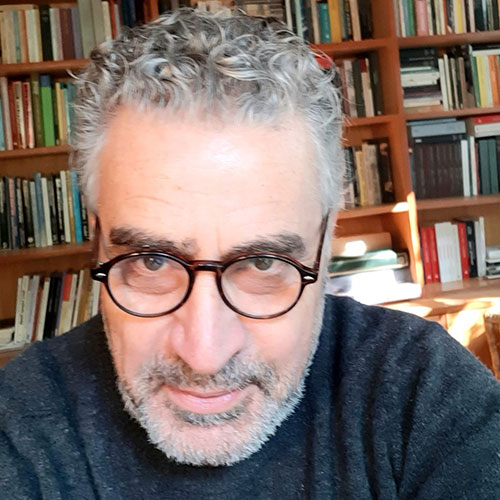
Mehmet Yashin
Mehmet Yashin is one of the known Cypriot poets and authors. He studied political science, history, and literature in universities of Turkey, Greece, and Britain, and received a doctorate degree. He has published 10 poetry collections, 3 novels, 6 literary studies, essays, and a collection of interviews. His award-winning books have been translated many languages.
The modern literature of Cyprus had flourished in the 19th century while the country was under British rule, therefore it was borned in three languages: Dominantly in Greek, and also in Turkish and English. To have a multilingual national literature may be unusual for many countries; this tradition is rooted in their history for Cypriots. We can see 3000 years old epigraphs side by side in ancient Greek and Phoenician alphabets, and many literary texts both in Greek dialect of Cyprus (Kypriaka) and partly in French and Italian in medieval times; and in the early-modern era in Ottoman-Turkish and English, or in mixed language texts. Since Greek was the one which represented continuity as the most important literary language, we should begin with it to review contemporary literature.
The prominent literary figure during the foundation period of modern literature was Vasilis Michaelides who is accepted as the national poet. It was Michaelides who established Kypriaka as a language medium for the country’s written literature, he also used Turkish and English words mixed with his Greek-writing poems. This more local and hybrid tradition couldn’t become the mainstream of the future works in Modern Cypriot Literature which was divided and studied according to separate languages under the influences of the Greek and Turkish nationalisms.
&
After the years which were marked by a variety of literary trends like symbolism, romanticism, Parnassian and social poetry, nationalism rose sharply in all literary fields. Costas Montis was the main name in poetry and prose, who represented Greek nationalism with an ability to be above the narrow-minded nationalist ideology and see under the surface of things. He enriched Greek-writing Cypriot poetry by endowing it with a new dimension. In the years that followed 1940s and 1950s, new writers arrived to the literary scene who were called the “Independence Generation”. It included such names as Kyriakos Charalambides, Michalis Pashiardis, and Andreas Christofides. Foundation of the Republic of Cyprus in 1960 created opportunities for Greek-writing literature to flourish. We can see many authors and poets in 1960s and 1970s; such as Christodoulos Galatopoulos, Costas Vasileiou, Rina Katselli, Pavlos Valdesarides, Glafkos Alithersis, Pythagoras Drousiotis, Niki Marangou, Lefkios Zafeiriou, and others.
Kaytazzade Nazim was the leading figure in the foundation process of modern literature in Turkish on the island in the late 19th century. He was the very first novelist, also wrote poems and plays. Mussevvidzade Osman Cemal, Ahmet Tevfik, Mehmet Ali Akinci and others followed him as representatives of the “Innovation Period” in Ottoman-Turkish language Cypriot literature in all modern literary fields. Just like Greek-writing literature, the 1940s and 1950s were the years of rising nationalism under the influence of Turkey. Most poems which were written syllabic and later free meter had romantic, folkloric, and patriotic contents. Suleyman Ebeoglu, Urkiye Mine Balman, Pembe Marmara, Ozker Yashin, Hikmet Afif Mapolar, Samet Mart, and many new names appeared with their poems, novels, short stories.
Most of the English-writing Cypriot authors were actually bilingual, some cases trilingual. One of the early poets, Vassos Yermasiotis even wrote English language poems in Greek letters. Necmi Sagip Bodamyalizade, was not only poet and author in both English and Turkish, but also he was the first translator of Kuran as narrative-poetry style into English. While Taner Baybars’ earliest works were in Turkish and latest works were in French, the rest of his books which gave him recognition in Commonwealth countries were in English. We can also name Nayia Roussou, Xantos Lyssiotis, Osman Turkay as English-writing Cypriots alongside Hadji Mike, Lyssandros Pitharas and Alev Adil who belong to post-1974 Cyprus. Unlike Greek-Cypriot and Turkish-Cypriot authors, Armenian-Cypriots usually prefer to write in English, and they are very successful. Internationally most known recent literary figure is Nora Nadjarian.
&
The Greek Junta’s coup dêtat and the following Turkish invasion of the island in 1974 was a defining event for the recent literature of Cyprus in both Greek-Cypriot and Turkish-Cypriot communities. This tragedy which caused division of the country has provided the basic underlying layers for the inspiration of the authors followed. One of unique poets is Pantelis Michanikos, whose works delves into the depth of existence. Also should be mentioned the names of Kyriacos Plisis, Theodosis Nicolaou, Yiannis Katsouris, Panos Ioannides, Evi Meleagrou, Yiorgos Moleskis, Michalis Pieris, Petros Stylianou, Nasa Patapiou, Christos Hadjipapas, Nicos Orphanides amongst others.
Cyprus literature after 1974 moved on to new directions of expressions, formulating through the passage of time its own identity. Cypriotness became more dominant than Greek and Turkish identities. Since then, using the common cultural resources of Cypriot identity in literature has been the main tendency in both Greek-writing and Turkish-writing books. The “1974 Generation” rose and influenced the earlier poets and authors too. This is particularly true for Turkish-Cypriot literature. Mehmet Kansu, Bekir Kara, Fikret Demirag, and Ozden Selenge followed the new understanding represented by Hakki Yucel, Nese Yashin and other youngsters from the 1980s onward.
But the 21st century’s new poets and authors are not dealing with the national identity issue like previous ones. They are much more integrated to the general themes of European Literature with their individual voices. Some of them, like Maria Siakalli, write poems in both Greek and Turkish languages. Cadences, a popular literary journal in English also publishes texts in Greek and Turkish. While Nea Epohi, Pneumatiki Kypros, Diorama, Kypriaki Estia are periodicals in Greek, Duvardaki Delik, Gaile are in Turkish. Vakis Loizides, Aimilios Solomou, Emel Kaya, Nafia Akdeniz, Constantias Sotiriou, Christos Kythereotis, Halil Karapasaoglu, Maria Ioannou, Marina Konstans, Apostolos Makridis, Jenan Selcuk, Kostas Patinios, Vangelis Hatzivasilies, and many more are emerging literary figures.